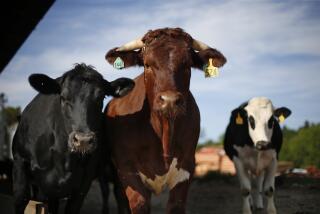Garden-variety vaccines may be edible alternative
- Share via
Someday, getting inoculated against diseases may be as easy as munching on tomatoes and lettuce or swallowing capsules stuffed with genetically altered vegetables. Already, plant biologists have devised an experimental potato-derived vaccine that reduces the risk of contracting hepatitis B, a viral infection that attacks the liver.
Each year the disease sickens 350 million people worldwide and kills 1 million; although there is an effective vaccine, many impoverished nations can’t afford it.
“This is exciting research because the vaccine survived in the digestive tract, and the body was able to pluck out the protein that stimulated an immune response,” says Dr. Carol O. Tacket, a scientist at the University of Maryland, Baltimore who has studied plant-derived vaccines. “A real critical mass is forming around this technology, which could lower the cost of vaccines and decrease the risks of taking them.”
The genetically engineered, potato-derived hepatitis B vaccine is the first in an anticipated wave of edible vaccines that experts say could save millions of lives, especially in the developing world in which 3 million infants die each year from preventable diseases such as tetanus, diphtheria and measles.
Oral vaccines made from plants have many distinct advantages over conventional vaccines. They can be made for pennies a dose, compared with up to $40 for conventional shots; they need no refrigeration because they don’t contain live viruses; and they’re safer than injections, which require syringes that can become accidentally contaminated and transmit diseases such as HIV.
They could even be grown in the country in which they are used, thus avoiding the costly logistics of transporting vaccines over extremely long distances.
“An oral vaccine is also more acceptable to people in the developing world than some stranger with an ice chest putting needles in the arms of their kids,” says Charles Arntzen, a plant biologist at Arizona State University in Tempe who helped devise the potato-based hepatitis B vaccine.
The vaccine was made by splicing a gene from the hepatitis B virus into potatoes’ genomes. The gene is responsible for producing antigens that prompt the body’s immune system to dispatch antibodies, the protective cells that fight viruses. The potatoes were then cloned and cultivated.
In a recent test of 42 human volunteers, about 60% showed signs of immunity against hepatitis B after eating bite-sized pieces of the raw genetically-altered potatoes. Conventional vaccines for the virus have a 90% immunization rate.
Since then, Arntzen and his colleagues, in hopes of boosting the immune response, have taken the technology one step further. They’ve freeze-dried slivers of the genetically modified potatoes and ground them into a flaky powder, creating an extract whose potency can be measured. The material can then be packed into gelatin capsules.
The capsule form allows researchers to create uniform doses of the antibody-producing antigens contained in the potatoes -- and prevent the transgenic edibles from inadvertently cross-pollinating with regular crops and becoming part of the food chain.
Arntzen says he hopes an edible hepatitis B vaccine will be available with the next five years.
“This is a new strategy for producing and disseminating vaccines in places that are hard to reach,” he says.
*
(BEGIN TEXT OF INFOBOX)
The next crop of vaccines
Edible vaccines to thwart other pathogens are also in the pipeline.
Using potatoes, tobacco and tomatoes, Arizona State University researchers are developing plant-based vaccines to combat cholera, the Norwalk virus (an intestinal infection that is the scourge of cruise ships) and the human papilloma virus, which causes cervical cancer. Scientists at Thomas Jefferson University in Philadelphia have devised transgenic spinach, which preliminary human tests showed stimulated the production of antibodies to rabies.
On another front, Loma Linda University researchers have developed a potato-based vaccine that could prevent Type 1 diabetes, which is caused by an autoimmune destruction of the insulin-producing cells in the pancreas. A 1999 animal study showed the vaccine reduced the onset of diabetes by nearly 60%, according to William H. R. Langridge, a biochemist at Loma Linda University School of Medicine.
“The next step is human trials,” he says.






